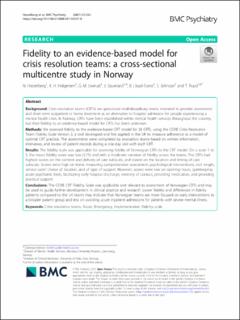| dc.contributor.author | Hasselberg, Nina Eide | |
| dc.contributor.author | Holgersen, Kathrine Høyer | |
| dc.contributor.author | Uverud, Gunn-Marit | |
| dc.contributor.author | Siqveland, Johan | |
| dc.contributor.author | Lloyd-Evans, Brynmor | |
| dc.contributor.author | Johnson, Sonia | |
| dc.contributor.author | Ruud, Torleif | |
| dc.date.accessioned | 2021-08-26T11:22:19Z | |
| dc.date.available | 2021-08-26T11:22:19Z | |
| dc.date.created | 2021-06-24T10:58:49Z | |
| dc.date.issued | 2021 | |
| dc.identifier.citation | Hasselberg, N., Holgersen, K. H., Uverud, G. M., Siqveland, J., Lloyd-Evans, B., Johnson, S., & Ruud, T. (2021). Fidelity to an evidence-based model for crisis resolution teams: a cross-sectional multicentre study in Norway. BMC Psychiatry, 21, Article 231. | en_US |
| dc.identifier.issn | 1471-244X | |
| dc.identifier.uri | https://hdl.handle.net/11250/2771397 | |
| dc.description.abstract | Background: Crisis resolution teams (CRTs) are specialized multidisciplinary teams intended to provide assessment and short-term outpatient or home treatment as an alternative to hospital admission for people experiencing a mental health crisis. In Norway, CRTs have been established within mental health services throughout the country, but their fidelity to an evidence-based model for CRTs has been unknown.
Methods: We assessed fidelity to the evidence-based CRT model for 28 CRTs, using the CORE Crisis Resolution Team Fidelity Scale Version 2, a tool developed and first applied in the UK to measure adherence to a model of optimal CRT practice. The assessments were completed by evaluation teams based on written information, interviews, and review of patient records during a one-day visit with each CRT.
Results: The fidelity scale was applicable for assessing fidelity of Norwegian CRTs to the CRT model. On a scale 1 to 5, the mean fidelity score was low (2.75) and with a moderate variation of fidelity across the teams. The CRTs had highest scores on the content and delivery of care subscale, and lowest on the location and timing of care subscale. Scores were high on items measuring comprehensive assessment, psychological interventions, visit length, service users’ choice of location, and of type of support. However, scores were low on opening hours, gatekeeping acute psychiatric beds, facilitating early hospital discharge, intensity of contact, providing medication, and providing practical support.
Conclusions: The CORE CRT Fidelity Scale was applicable and relevant to assessment of Norwegian CRTs and may be used to guide further development in clinical practice and research. Lower fidelity and differences in fidelity patterns compared to the UK teams may indicate that Norwegian teams are more focused on early interventions to a broader patient group and less on avoiding acute inpatient admissions for patients with severe mental illness. | en_US |
| dc.language.iso | eng | en_US |
| dc.rights | Navngivelse 4.0 Internasjonal | * |
| dc.rights.uri | http://creativecommons.org/licenses/by/4.0/deed.no | * |
| dc.title | Fidelity to an evidence-based model for crisis resolution teams: a cross-sectional multicentre study in Norway | en_US |
| dc.type | Peer reviewed | en_US |
| dc.type | Journal article | en_US |
| dc.description.version | publishedVersion | en_US |
| dc.rights.holder | © The Author(s), 2021. | en_US |
| dc.source.volume | 21 | en_US |
| dc.source.journal | BMC Psychiatry | en_US |
| dc.identifier.doi | https://doi.org/10.1186/s12888-021-03237-8 | |
| dc.identifier.cristin | 1918105 | |
| dc.source.articlenumber | 231 | en_US |
| cristin.ispublished | true | |
| cristin.fulltext | original | |
| cristin.qualitycode | 2 | |

